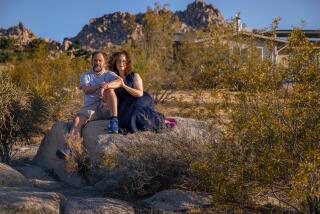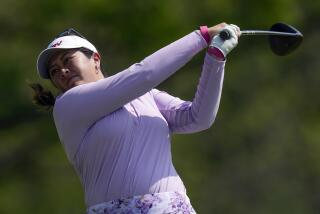After All This, Golf Is Easy : LPGA: A mugging was only the latest in a series of painful events for Jan Stephenson. That she can return to the sport at all is a welcome relief.
SCOTTSDALE, Ariz. — It’s as if someone or something were trying to get Jan Stephenson’s attention. For what, though, remains unclear.
Or maybe it was Stephenson’s time to experience pain and suffering, if there is such a period. Stephenson’s recent streak of bad circumstance has been unrelenting.
Her father, Frank Stephenson, died of cancer in December of 1988. He was buried in the family’s homeland, Australia, on Stephenson’s birthday. A year later, Stephenson’s longtime caddie, Rick White, also died of cancer.
Then, in January of this year, Stephenson’s ring finger was splintered when she was robbed in a parking lot in Miami. She and her husband, Eddie Vossler, were on their way to a Phoenix Suns-Miami Heat basketball game. Simply out for a little fun.
Instead, Stephenson suffered a career-threatening injury. Doctors were concerned she would never be able to grip a golf club well enough to compete. And they withheld that concern from her for months because it came at a time when Stephenson, at 38, was groping for the strength to grip life again.
Today, after 10 months of physical therapy and emotional rest, a seemingly resilient Stephenson will rejoin the LPGA tour at the Planters Pat Bradley International tournament at High Point, N.C. Undaunted, she’s grateful for another chance.
“You’re fortunate if you can get through life without these kind of things happening,” Stephenson said. “But it does happen and people say, ‘Jan, fathers die.’ Yes they do. But when my father died, it was very hard for me. Then my caddie died, and my brother-in-law was killed in December of ’87.
“It kind of wakes you up to the reality about life. You can get so carried away, and I do, I really live a wonderful life. I mean I had everything go perfect for so long. I have been fortunate to have a great relationship with my family, and to have been pretty healthy.
“And I have always appreciated it, but after this, you just never know.”
SUDDEN DEATHS
From the time Stephenson was 10, she traveled through life as the nucleus of a support group.
Frank Stephenson wanted his daughter to be an athlete. So at age 7, she trained to be a swimmer. Then it was tennis. But when Frank got interested in golf, Jan did, too. “Of course, I wanted to do whatever he wanted, and I loved golf,” she says.
Stephenson’s mother, Barbara, had been a professional dancer and a good golfer. But Stephenson says her parents’ lives had always been centered on her.
“My father would pick me up from school, and we would go practice golf and come home,” Stephenson said. “We would eat and work on my homework together. Then we would go to the driving range at night. I spent all my time with my family.”
As a professional, Stephenson’s team included Eddie, whom she married in 1982, and her caddie, Rick.
“I always thought of my father as the quarterback,” Stephenson said. “We would work on my game together and he would watch me play all summer. My mother would make breakfast for me while I was out working. Ever since I can remember, it had always been a team. That’s why I think people did not understand why I was having so much trouble with my father’s death. Sponsors would say, ‘C’mon, everyone loses their father,’ but this was devastating.”
When her father’s condition was diagnosed as cancer, Stephenson’s parents didn’t tell her. She wondered why they weren’t coming to watch her play so often.
“In August (of 1988), I got a letter from my mother that said I had to call this doctor,” Stephenson said. “And when I called the doctor, he told me he didn’t think my father would last the week. I was in a state of shock. Last a week from what?”
Every chance Stephenson got, she would fly home to Australia, a situation she says led her to contract mononucleosis. But her father wouldn’t let Stephenson stay with him in Australia. He wanted her to keep playing golf.
The day before Frank Stephenson died, he talked with his daughter on the phone and made her promise she would finish a tournament in Puerto Rico. When he died the next morning, Stephenson made good on her promise and finished second.
The next year on tour, she started off playing well. But she couldn’t get over the heartache.
“After Dad died, every time I would look up on the golf course, I would remember where he would stand, in certain places among the trees. People who didn’t know he had died would come up to me and say, ‘Where’s Frank, I have his beer.’ And I just couldn’t handle it. I would just walk off the course.”
Stephenson’s mononucleosis was diagnosed in early January, and doctors urged her to take three months off to recover. She refused. Finally, last August, beaten down and exhausted, she left the tour.
Of the 22 tournaments she started in 1989, she finished 12. She never discussed why she pulled out of tournaments, and many people thought it was because of the lingering back and neck problems she had suffered from a previous car accident. Eddie didn’t want her harping on it, and Stephenson said she didn’t want to make excuses.
Stephenson sent her mother home to Australia, because her presence on the tour made Stephenson’s memories of her father unbearable. She finished 45th on the LPGA money list, the lowest in her 16-year career.
“My caddie was close to my father also, so that year we talked about it a lot. Then Rick was diagnosed in October as having lung cancer. I would call the doctor every day, but when he died in December, it just wouldn’t register.
“I have to start all over with a new team.”
MUGGED IN MIAMI
Stephenson was eager to play this year, and started the season by tying for 10th at the Jamaica Classic in January, the first scheduled LPGA tournament. Her next tournament stop was scheduled for Boca Raton, Fla., but she would never get to play.
While in Florida before the tournament began, she and Eddie decided to take in a basketball game. They had just parked their rental car when Stephenson was mugged.
“The owners of the Phoenix Suns invited us to the game (against the Miami Heat). We got there early, and drove around for a long time trying to find the a safe place to park,” Stephenson said. “It’s not the greatest area, and the irony is that we were being extra careful. Eddie was backing up into a space, and I pulled the trunk lid and got out of the car.
“I went to put the (cellular) phone into the trunk and I felt someone rip my purse out of my hand. I turned around and saw this big guy, and I said ‘OK, you can have this.’ ”
“But he kept pulling on my left hand and I didn’t know if he was after the phone or what. Then the phone went flying, but he was still pulling. I didn’t know what he wanted and I started to resist and started screaming. It didn’t register that he was after my ring. An attendant ran to help me and the guy (mugger) pushed me in front of this attendant and took off.
“Eddie was still in the car, and he couldn’t see me because the trunk lid was up. A policeman told me that they (muggers) look for rental cars because usually vacationers don’t come back and prosecute. He also told me that I was lucky, because most (muggers) just cut the finger off.”
Her finger was twisted and hanging from her hand. But she still went to the game, and the Suns’ trainer treated the injury. Not only was her finger splintered, but the scar tissue surrounding it was severly damaged. Surgery was scheduled immediately.
“The mail I have gotten from people who have been robbed is unbelievable,” she said. “When my father died, I received a lot of letters. But since this happened to me, you should see the letters I get explaining the horrible things that have happened to people.
“When I think of the things that I have done over the years--wandering through airport parking lots at 1 in the morning, or being the last one out of a mall, and trying to find my car. Now, I am much more cautious.”
STARTING OVER
It’s noon at the Orangetree Country Club. The sun, harsh and hot, seems to soften as it glistens off the lake and warms the green grass of this luscious course.
Stephenson, sitting under an awning on the dining patio, looks out and smiles once again at this familiar site. After months of therapy on her finger, and hours practicing on this putting green, she’s eager to be playing again.
Her doctor waited until she was out of danger to voice his early concern that her finger might not heal enough for her to compete.
Her finger still isn’t completely healed and doctors won’t allow her to return to the tour full time. She hopes that will be in July. But it’s clear from the spark in her eyes that her soul is healing as well.
Of her father, the memories are now more comforting, “I was so fortunate to have had him, we had a ball,” she says.
Of her younger brother, Greg, a fireman who lives in Australia, “He would like to caddie for me, but I don’t know if I’m ready for that move yet.”
And of the chance to play again, she says she’s more than ready. “After my career, it would have been devastating to me not to get another chance.”
However, Stephenson, quoted Wednesday in the Arizona Republic, said that the LPGA semi-forced her to return a week early in order to keep her spot in the tour’s first Skins Game. “That really got me upset,” Stephenson was quoted as saying. “. . .I’ve paid my dues and I deserve to be in (the Skins Game).”
Neither Stephenson nor her agent would confirm the report. Yet if Stephenson has anything to do with it, she won’t carry those emotions to the course.
“Mentally, I have been too emotional, so up and so down, and that’s not good in golf,” Stephenson said. “But I couldn’t understand why it wasn’t good, because it was all a part of me.
“But last week I watched the men on television, then I watched the women. I saw the women doing the same thing as I do, like getting upset over a putt. But the men weren’t doing that. And I think I have finally seen the light. . . . I think it’s because there is so much money in it for the men, that they cannot allow a mental slip-up. And it is getting that way with us.
“I’ve been at both extremes. It’s been the end of the world if I three-putt. And then, last year, all I could think of was what does it matter if I miss a putt, my father is dead.
“It’s almost like it’s taking me this long to grow up.”
Stephenson’s cellular phone, kept in her purse, begins to ring. It’s Eddie, who is in Las Vegas on business--he builds golf courses. He was Stephenson’s first date in the United States, introduced by Marlene Hagge in 1974.
She smiles when she tells the story. For Stephenson, that was many tears ago.
More to Read
Go beyond the scoreboard
Get the latest on L.A.'s teams in the daily Sports Report newsletter.
You may occasionally receive promotional content from the Los Angeles Times.










